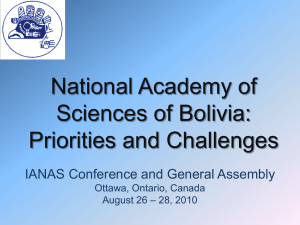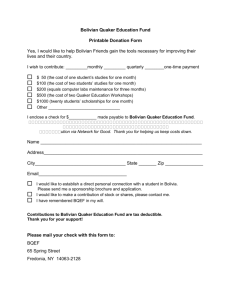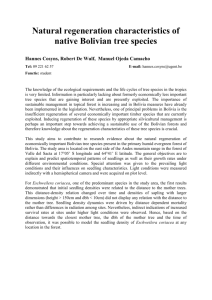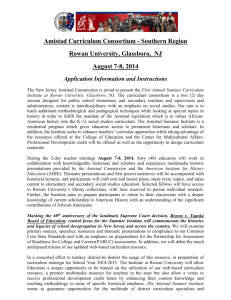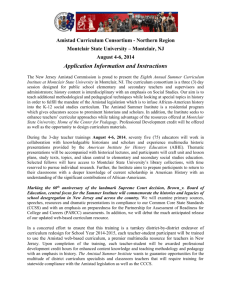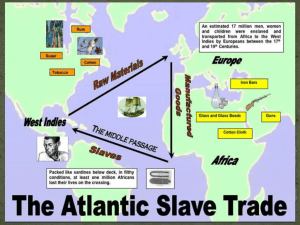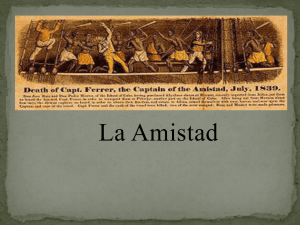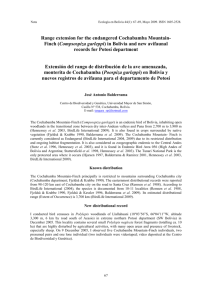AMISTAD MISSION VISITOR GUIDE
advertisement
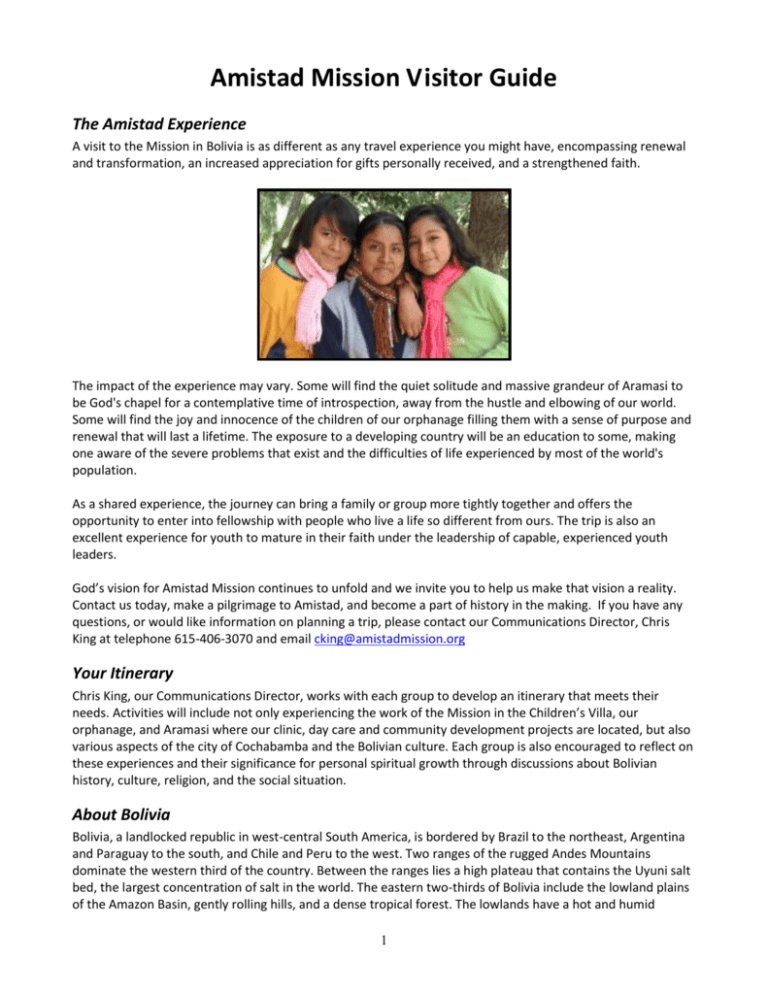
Amistad Mission Visitor Guide The Amistad Experience A visit to the Mission in Bolivia is as different as any travel experience you might have, encompassing renewal and transformation, an increased appreciation for gifts personally received, and a strengthened faith. The impact of the experience may vary. Some will find the quiet solitude and massive grandeur of Aramasi to be God's chapel for a contemplative time of introspection, away from the hustle and elbowing of our world. Some will find the joy and innocence of the children of our orphanage filling them with a sense of purpose and renewal that will last a lifetime. The exposure to a developing country will be an education to some, making one aware of the severe problems that exist and the difficulties of life experienced by most of the world's population. As a shared experience, the journey can bring a family or group more tightly together and offers the opportunity to enter into fellowship with people who live a life so different from ours. The trip is also an excellent experience for youth to mature in their faith under the leadership of capable, experienced youth leaders. God’s vision for Amistad Mission continues to unfold and we invite you to help us make that vision a reality. Contact us today, make a pilgrimage to Amistad, and become a part of history in the making. If you have any questions, or would like information on planning a trip, please contact our Communications Director, Chris King at telephone 615-406-3070 and email cking@amistadmission.org Your Itinerary Chris King, our Communications Director, works with each group to develop an itinerary that meets their needs. Activities will include not only experiencing the work of the Mission in the Children’s Villa, our orphanage, and Aramasi where our clinic, day care and community development projects are located, but also various aspects of the city of Cochabamba and the Bolivian culture. Each group is also encouraged to reflect on these experiences and their significance for personal spiritual growth through discussions about Bolivian history, culture, religion, and the social situation. About Bolivia Bolivia, a landlocked republic in west-central South America, is bordered by Brazil to the northeast, Argentina and Paraguay to the south, and Chile and Peru to the west. Two ranges of the rugged Andes Mountains dominate the western third of the country. Between the ranges lies a high plateau that contains the Uyuni salt bed, the largest concentration of salt in the world. The eastern two-thirds of Bolivia include the lowland plains of the Amazon Basin, gently rolling hills, and a dense tropical forest. The lowlands have a hot and humid 1 environment, while the mountains feature a cooler, arid climate. Natural resources include gold, silver, tin, zinc, iron, oil, natural gas, timber, and hydropower. More than half of the country’s population is indigenous Amerindian, including the Quechuas, Aymaras, and Guaraní. The majority of Caucasian Bolivians, who make up 15 percent of the population, are of Spanish descent. Mestizos (a mixture of Caucasian and Amerindian) represent 30 percent of inhabitants. Spanish is the official language of the country and is spoken by more than 80 percent of the people. The Aymara and Quechua languages are widely spoken. Although the government has vowed to reduce the economic inequality, many health issues related to poverty still remain. Access to health services among indigenous groups is limited. Six percent of Bolivian children do not live to see their fifth birthday — the second-highest rate in South America. Malnutrition rates are also high, resulting in approximately 27 percent of children exhibiting stunted growth. The United Nations estimates that while there is enough food in to feed the entire population, many of the rural, indigenous poor, still suffer from hunger. Travel Visa Requirement for Bolivia U.S. citizens entering Bolivia are required to have a visa issued by the Bolivian government. Bolivian tourist visas are valid for five years from the date of issuance and allow the bearer to enter the country three times in a year for a cumulative stay of not more than ninety days. The cost of the tourist visa is $135 U.S. dollars. The fee can be paid in cash, by deposit to the Bolivian Consulate’s bank account or by money order. Tourists applying for their visas upon arrival in Bolivia must pay this fee in cash to immigration authorities. In addition to the $135 fee and visa application, the applicant must present: Recent 4x4 [cm] color photograph without glasses Passport with a validity of not less than 6 months Letter of invitation which Amistad will provide Round trip ticket or itinerary Photocopy of International Vaccination Certificate for Yellow Fever Flights From Miami, direct service to La Paz or Santa Cruz is provided by American Airlines and Aerosur. There are some day time flights although most are overnight, leaving Miami around 11:00 p.m. and arriving early the next morning. By flying through Santa Cruz (located in the low plains of Bolivia) one will avoid the shock of stepping into the rarefied air of La Paz at 13,500 feet. If you do go through La Paz, breath deeply, walk slowly and avoid carrying baggage if possible. The flying times between La Paz and Cochabamba and Santa Cruz and Cochabamba are thirty-five and forty-five minutes, respectively. Luggage American Airlines and Aerosur currently allows 2 bags to be checked, each no more than 62 inches (calculated as length + width + depth) and weighing no more than 50 pounds. You are also allowed one carry on item plus a purse or small bag. The carry on item can be no larger than 45 inches and weigh no more than 40 pounds. If you are traveling on a different airline, you will want to check with your airline regarding their luggage specifications. You may consider including a backpack of some sort as one of your carry on items to have available if you plan on doing day trips or excursions in Bolivia. Arriving in Bolivia After clearing immigration and customs at the Cochabamba airport, an Amistad representative will greet and take you to the Amistad Guest House, La Morada, overlooking the city of Cochabamba. 2 Accommodations La Morada, “The Dwelling Place,” accommodates 11 guests in private rooms, and as many as 17 with sharing. Bathing facilities are shared. There is a small chapel ideal for personal reflection or group worship. There is also a small living room, a dining room, a kitchen and a hand laundry area. La Morada offers hospitality to approximately 100 North American visitors each year. Room and Board Visitors to Amistad Mission are asked to cover the expenses of being hosted. The charge is currently $75/day for adults and $50/day for youth. This price includes room and board, transportation in Cochabamba and to Aramasi, driver, and a Spanish speaking guide furnished by Amistad. This fee should be paid to our U.S. office at 55 Scott Street, Buford, GA 30518, before you begin your trip with a check made out to Amistad Mission. We also ask that your group consider leaving an appropriate gratuity with the staff at La Morada, the guide and the driver (most groups leave $20 - $30 per staff member). Long Distance Phone Calls and Internet Access There is a phone at La Morada. However, rates will be much better if you have a phone card or code from your carrier; check with your carrier to get information. Mobile phones with a GSM 1900 band should work in all places except Aramasi. Two internet cafes are located within walking distance from La Morada, and your guide can direct you to their locations when you arrive. Emergency Contact Numbers in Bolivia Friends and family can reach our guests in Bolivia at the following numbers: Amistad Mission Office Number: (011) 591-4-430-0007 Retreat Center, La Morada, Number: (011) 591-4-445-6308 Lila Ewel, Bolivian Director, (011) 591-7-221-7704 María Reneé Vásquez, Villa Coordinator, (011) 591-7-222-6128 Kattya Rodriguez, Bolivian Guide, (011) 591-7-147-6825 Other Expenses Extra trips to the countryside, going out to eat, and shopping are all personal, extra expenses. Bolivia offers a wide variety of local handicrafts, weavings, jewelry, sweaters, etc. Visitors often report spending $20 to $300 on these and other items. You will need to save $25 per person for the departure tax at the airport. This departure tax may only be paid in U.S. dollars or Bolivianos. Credit cards cannot be used to pay the tax. Electrical Current Electricity in Bolivia is 230 Volts, alternating at 50 cycles per second. If you travel to Bolivia with a device that does not accept 230 Volts at 50 Hertz, you will need a voltage converter. There are three main types of voltage converter. Resistor-network converters will usually be advertised as supporting something like 50-1600 Watts. They are light-weight and support high-wattage electrical appliances like hair dryers and irons. However, they can only be used for short periods of time and are not ideal for digital devices. Transformers will have a much lower maximum Watt rating, usually 50 or 100. Transformers can often be used continuously and provide better electricity for low wattage appliances like battery chargers, radios, laptop computers, cameras, mp3 players and camcorders. However, they are heavy because they contain large iron rods and lots of copper wire. 3 Vaccinations The following immunizations are recommended by the Center for Disease Control for travel to Cochabamba. For updated information check with your local health department or the Center for Disease Control and Prevention’s hotline for international travelers at 1-877-394-8747 (1-877-FYI-TRIP) or http://wwwn.cdc.gov/travel/default.aspx. Please note that the Yellow Fever vaccination is required for entry into Bolivia. Additionally the Center for Disease Control recommends that you get the following vaccinations: Tetanus (good for 10 years) Oral Typhoid (good for 5 years) Hepatitis A (need a booster 6 months after initial vaccination, then good for 10-25 years) Medical Attention and Medication Should you need medical attention, there are fine doctors and clinics in Cochabamba. We, of course, recommend that visitors bring any prescribed medication they are currently taking, including any allergy medicine that you might need. There is no prescription requirement in Bolivia for many medicines, so if you need or forget some medication, it is probably available locally without a prescription, but may be expensive. Food and Water A concern when one visits South America is the possibility of gastro-intestinal problems. This is a risk. The food at La Morada and Aramasi are carefully prepared with North American stomachs in mind and bottled water is provided. It is important to be careful of airport food, soft drinks chilled with ice cubes that may come from non-potable water, and any food sold on the streets. What to Pack Because of the high altitude, but relative closeness to the equator, the nights are generally cool and the days warm, which is why Cochabamba is called the city of eternal springtime. Bolivian winter (June to August) is the dry season, with little rain, low humidity and dusty conditions. The temperature ranges from nightly lows of 30° to daytime highs of 80°. A sweater or sweatshirt and light jacket are recommended. Layers are the most convenient way to dress for the wide range of temperature changes. It is important to remember that the sun is intense. When you are outside, be sure to have sunscreen, a good hat, and sun-glasses as well as skin moisturizer, lip balm, and bottled water. Bolivian summer (December to February) is the rainy season with frequent showers. Cloudy rainy days are cool with highs of 70° and sunny days are warm with high of 85° - 90°. Nightly lows are 60°-65°, so a light jacket or sweater is recommended. Spring and fall are generally very pleasant with warm temperatures and slight chances of rain. Bolivians generally wear long pants and the women wear skirts that are below the knee but shorts are becoming more acceptable. Items to pack: Socks Underwear Shirts Pants (shorts are ok weather permitting) Shoes sturdy walking shoes or boots 1 or more casual flip-flops for La Morada shower facility Light jacket or sweater Hat Sunglasses Toiletries 4 Personal medications Sunscreen Lip balm or chap stick (with sunscreen) Eye drops (high altitude/dry air) Lotion (high altitude/dry air) Hand sanitizer (Purell or other alcohol based) Camera/film (charger for digital camera) Electric Converter (220v/50hz) Journal or notepad and pens Bible Travel alarm Flashlight (especially for Aramasi) Passport (plus a photo copy) Immunization record Money ($200) - will need to pay for the visa and departure tax at airports Credit card (Visa or MasterCard) Ear plugs (if you are a light sleeper) Currency The local currency is referred to as the Peso-Boliviano (Bs) and is valued at approximately 6.80 to the US dollar. It is best not to buy Bolivian currency before arriving due to unfavorable exchange rates. US dollars are easily exchanged or taken in payment except for one dollar bills sometimes. Also, bills with the slightest tears in their edges or otherwise mutilated are considered non-negotiable, so bring newer, crisper currency. Most credit cards and ATM cards work well, although there is no American Express office in Cochabamba. Amex Travelers checks are difficult to negotiate. Communications with Amistad To receive the Amistad Mission newsletter, electronic communications or other general correspondence or to receive more information on any Amistad programs, schedule a visit with your group or church, you may contact the Amistad Mission office at 55 Scott Street, Buford, Georgia. Our Communications Director, Chris King, lives in Nashville, Tennessee and may be contacted directly by telephone at 615-406-3070 or by email cking@amistadmission.org. You may find Amistad’s website at www.amistadmission.org. Amistad Mission Forms Prior to your visit, please complete the forms below and send to the Amistad Mission offices at: Amistad Mission 55 Scott Street Buford, GA 30518 1. Participant Information Form 2. Agreement and Release by Participant and Parent 5 Amistad Mission Participant Information Form Participant’s Name (please print as stated on passport) _____________________ ________________________ (If participant is a minor, please include name and address of parents/ guardians below**) Dates and name of group with which you will be traveling___________________________________________ Participant’s Home Address Number & Street__________________________________________________ City________________________State_________________Zip____________ Telephone Nos.: Home____________________Work___________________Mobile____________________ E-mail Address ______________________________________Fax Number____________________________ **If Participant is a minor, please provide: Name of Parent(s)/Guardian(s) ________________________________________________________ Address of Parent(s)/Guardian(s): Number & Street_________________________________________ City_________________________State____________Zip________ Telephone of parent(s)/Guardians: Day time ___________________Night time___________________ In case of Emergency, please notify: Name: _______________________________Relationship:____________Email________________________ Address: # and street ____________________________City__________________State________Zip_______ Telephone: Day time________________Night time________________Mobile__________________ Participant’s Passport #_____________________________Passport Country of Issue_____________________ Passport Expiration Date____________________________Visa Expiration Date_________________________ 6
